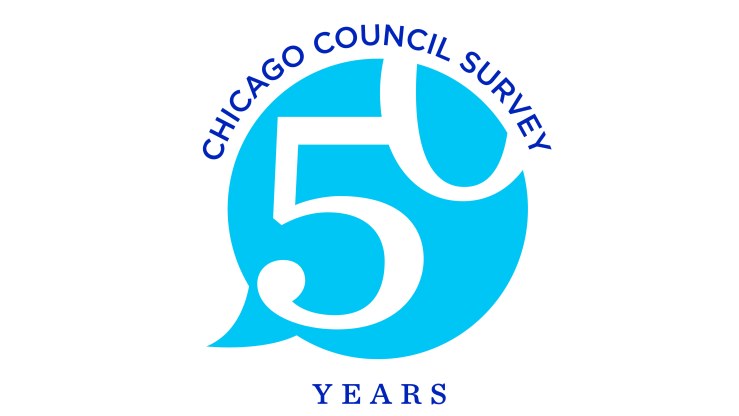Pluralities also say the United States has given Israel either the right amount or not enough military assistance and support.
Despite many efforts to resolve critical differences between Israel and Hamas in peace negotiations last week—facilitated by Egyptian and Qatari officials—the talks concluded with no immediate breakthrough. Meanwhile, the US State Department recently announced it will release $3.5 billion in foreign military financing to Israel—from the $14.5 billion supplemental security package passed by Congress in April—despite mounting calls to condition US military aid to Israel as the civilian death toll from its operations in Gaza far surpasses 40,000.
Data from the 2024 Chicago Council Survey, fielded June 21–July 1, 2024, and from a Council-Ipsos poll, fielded August 9–11, 2024, show that Americans favor supporting Israel militarily until the hostages remaining in Gaza are returned. But a narrow majority also think the United States should condition its military aid to Israel, so that it is not used against Palestinian civilians.
Key Findings
- The majority of Americans (61%) believe the United States is playing a somewhat (46%) or very (15%) positive role in resolving key problems in the Middle East.
- When asked about specific US policies toward the Israel-Gaza conflict, nearly a third of Americans decline to give their opinion.
- A plurality of Americans (42% combined) think the United States is either striking the right balance (22%) in its overall support for Israel or not supporting it enough (20%). However, a significant share also think it is supporting Israel too much (30%). A similar plurality (43% combined) say the United States is giving Israel either the right amount (26%) or not enough (17%) military aid, while a third (34%) say it has given Israel too much.
- Six in 10 Americans (60%) favor the United States supporting Israel militarily until the hostages are returned and about half (49%) favor such support until Hamas is dismantled.
- Americans are also concerned about Palestinians, and especially civilians. A narrow majority (53%) think the United States should restrict its military aid to Israel so it cannot use the aid in military operations against Palestinians.
- Three in 10 Americans say the United States is not providing enough humanitarian assistance to Gazans, while a quarter say it has been the right amount (25%).
- The majority (57%) oppose the United States taking a leading role in postwar reconstruction efforts.
Most Americans Believe the United States Is Playing a Positive Role in the Middle East
Israel’s recent string of political assassinations has pushed it, and the United States, closer to a wider war with Iran and Hezbollah that the Biden administration is eager to avoid. Over the last few months, the United States has played a leading role in ceasefire talks by backing proposals and sending mediators to bridge differences between Israel and Hamas.
When assessing the US role in resolving the problems facing the Middle East, six in 10 Americans (61%) believe the United States is playing a somewhat (46%) or very (15%) positive role. This is a slightly less favorable review than in 2015, at which point seven in 10 (69%) said the United States played a positive role in the region (see appendix figure 1). While two-thirds of Republicans (68%) and Democrats (66%) say the United States plays a positive role in mitigating regional challenges, Independents are more divided in their assessment (52%).
A plurality of Americans (42%) think US leaders are giving the conflict between Israel and Hamas about the right amount of attention, while the rest are at odds. A third (32%) think US leaders are not giving it enough attention and about a quarter believe it is getting too much attention (26%). Among partisans, pluralities contend that American leaders are giving the Israel-Hamas conflict about the right amount of attention.
Americans Say United States Gives Israel Right Amount of or Not Enough Support
Israel is the largest cumulative recipient of US foreign aid, collecting about $3.8 billion in economic and military assistance a year ($310 billion in total since its founding in 1948). Since the October 7 attack, the Biden administration has ardently supported Israel’s war against Hamas, providing it with an additional $8.7 billion in military aid and munitions—not to mention rhetorical, diplomatic, and public support.
When it comes to the United States’ overall support for Israel’s war in Gaza, more Americans (42%) think it is either striking the right balance (22%) or not supporting Israel enough (20%) than think it is supporting Israel too much (30%); however, almost the same amount say they are unsure (27%). A plurality of Republicans say the United States is not supporting Israel enough (40%), while pluralities of Democrats (40%) and Independents (34%) think it is supporting Israel too much.
More Americans (43%) also say the United States has given Israel either the right amount of (26%) or not enough (17%) military aid than say it has given Israel too much (34%), while an additional one in four (23%) say they are unsure. Republicans are similarly more likely to say the United States hasn’t given Israel enough military aid (34%), compared to pluralities of Democrats (42%) and Independents (39%) who say it gives Israel too much military aid.
Most Americans Favor Supporting Israel Until Hostages Are Returned
Throughout Israel’s 10-month assault on Gaza, Israeli Prime Minister Benjamin Netanyahu has asserted that there will be no permanent ceasefire in Gaza until Hamas’s military and governing capabilities are destroyed and all hostages are released. While Israeli military operations have succeeded in weakening Hamas, experts say Israel will likely face lingering armed resistance from Hamas for years to come.
Six in 10 Americans (60%) prefer the United States support Israel militarily until the 115 hostages remaining in Gaza are returned. While three-quarters of Republicans (76%) favor supporting Israel until the hostages are released, Democrats and Independents are far more divided (55% and 52%, respectively). When it comes to Hamas, fewer Americans (49%) favor the United States supporting Israel militarily until it is dismantled or destroyed, while 44 percent oppose supporting Israel until this military objective is achieved. Nearly seven in 10 Republicans (67%) favor supporting Israel until Hamas is dismantled, compared to only four in 10 Independents (44%) and Democrats (41%).
While Prevailing View Favors US Aid to Israel, Americans May Prefer Conditions
At the same time, a bare majority of Americans (53%) agree on restricting military aid to Israel so it cannot use the aid toward military operations against Palestinians, similar to previous readings. Seven in 10 Democrats (68%) and more than half of Independents (54%) support restricting military aid to Israel, while the majority of Republicans (59%) oppose doing so. While the share of Republicans who support placing restrictions on US military aid to Israel increased by 10 percentage points from 2021 (32%) to 2023 (42%), it has since returned to 2021 readings (35%).
Combined, nearly two-thirds of Americans (64%) also say the United States should pressure Israel to accept a ceasefire, either with diplomacy (27%) or by reducing arms shipments (37%). However, three in 10 (29%) say the United States should continue arm shipments to Israel and not pressure it to accept a ceasefire at all. While the majority of Republicans say the United States should continue its arms shipments to Israel and not put any pressure on it (53%), nearly half of Democrats (47%) and a plurality of Independents (42%) say the United States should pressure Israel to accept a ceasefire by reducing its weapons transfers. (see appendix figure 2)
In a survey by Defense Priorities, fielded July 18–24, 2024, a plurality of Americans (44%) said the United States should condition its aid to Israel so it takes more care to avoid civilian casualties (22%) and doesn’t involve the United States in a wider war (20%). At the same time, a third (34%) said the United States should stop sending aid to Israel altogether because of the humanitarian situation in Gaza (20%) and the risk of a wider regional war (14%). Although one in four (24%) also said the United States should give unconditional aid to Israel, most Americans in this survey insisted that the United States either condition or withdraw such aid because of its humanitarian impact and exacerbation of regional tensions.
Chicago Council survey data also show that the majority of Americans are opposed to sending US troops to Israel’s defense if it were attacked by Iran (56%) or other neighbors (55%). However, a bare majority support (54%) the use of American troops to be part of an international peacekeeping force to enforce a peace agreement between Israel and the Palestinians.
Americans Say United States Providing Right Amount of or Too Much Aid to Gaza
At a humanitarian aid conference in June, US Secretary of State Antony Blinken announced that the United States would send more than $400 million in humanitarian aid to provide food, potable water, healthcare, shelter, and psychosocial support for Palestinians in Gaza and the West Bank. This is in addition to the $1.8 billion in development, economic, and humanitarian aid the United States has sent to the Palestinian territories since 2021. The Biden administration has also urged Israel to take further steps to reduce civilian casualties and allow for the delivery of humanitarian aid to civilians in need.
Three in ten Americans think the United States has not provided enough humanitarian aid to civilians in Gaza (30%). A quarter think the United States is providing the right amount of humanitarian aid (25%), while 16 percent say the United States has provided too much humanitarian aid to civilians in Gaza (16%). An additional 28 percent are unsure. Democrats are most likely to think the United States hasn’t sent enough aid to Gazans (44%), while Republicans are most likely to say it has provided the right amount of aid (31%), On the other hand, equal shares of Independents say the United States hasn’t sent enough humanitarian aid (31%) as say they are unsure (32%).
When it comes to the day after, Americans largely oppose the United States playing a leading role in the reconstruction of Gaza (57%), something experts say would cost over $80 billion. Five in 10 Democrats (51%) support the United States leading reconstruction efforts, while majorities of Republicans and Independents oppose US leadership in this area (71% and 58%, respectively).
Conclusion
For the most part, Americans believe the United States is playing a positive role in mitigating the key challenges facing the Middle East and is giving Israel the right amount of—or not enough—military aid and support. Most Americans favor supporting Israel militarily until the hostages remaining in Gaza are released and, to a lesser degree, until Hamas is dismantled. At the same time, a substantial share of the population supports placing restrictions on military aid so it cannot be used in operations against Palestinians and thinks the United States could send more humanitarian aid to Gazans.
Democrats are more likely than other partisans to express criticism of the United States’ support for Israel and support humanitarian efforts in Gaza. While Vice President and Democratic presidential candidate Kamala Harris’s stance on the Israel-Gaza war does not deviate significantly from President Joe Biden’s, she has been more vocal about the humanitarian impact of the war and has urged senior officials in the administration to be tougher on Netanyahu. Harris’s recognition of Palestinians’ plight and right to freedom, dignity, and self-determination could draw support from Democratic and Independent voters discontented with Biden’s Gaza policy.
This analysis is based on data from the 2024 Chicago Council Survey of the American public on foreign policy, a project of the Lester Crown Center on US Foreign Policy. The 2024 Chicago Council Survey was conducted June 21–July 1, 2024, by Ipsos using its large-scale nationwide online research panel, KnowledgePanel, in English and Spanish among a weighted national sample of 2,106 adults 18 or older living in all 50 US states and the District of Columbia. The margin of sampling error for the full sample is ±2.3 percentage points, including a design effect of 1.1229. The margin of error is higher for partisan subgroups (±4.2 points for Republicans, ±3.9 points for Democrats, and ±3.8 points for Independents) or for partial-sample items.
Additional data in this report comes from a joint Chicago Council on Global Affairs / Ipsos survey. It was conducted August 9-11, 2024 by Ipsos using its large-scale, nationwide, online research panel, KnowledgePanel, among a weighted national sample of 1,091 adults 18 or older living in all 50 US states and the District of Columbia. The margin of sampling error for the full sample is ±3.1 percentage points including a design effect of 1.10.
Partisan identification is based on how respondents answered a standard partisan self-identification question: “Generally speaking, do you think of yourself as a Republican, a Democrat, an Independent, or what?”
The 2024 Chicago Council Survey is made possible by the generous support of the Crown family, the Korea Foundation, and the United States-Japan Foundation.





Related Content
 Public Opinion
Public Opinion
Results and analysis of the Council's annual survey of American views on foreign policy.
 US Foreign Policy
US Foreign Policy
The US public is now equally split on whether Israel’s war against Hamas in Gaza is justified or not.
 Public Opinion
Public Opinion
Americans are also slightly more likely to say Israel has gone too far in its war with Hamas than to say Israel’s actions are justified.
 US Foreign Policy
US Foreign Policy
Majorities across all racial groups prefer that the United States remain impartial as fighting between Israel and Hamas continues.


